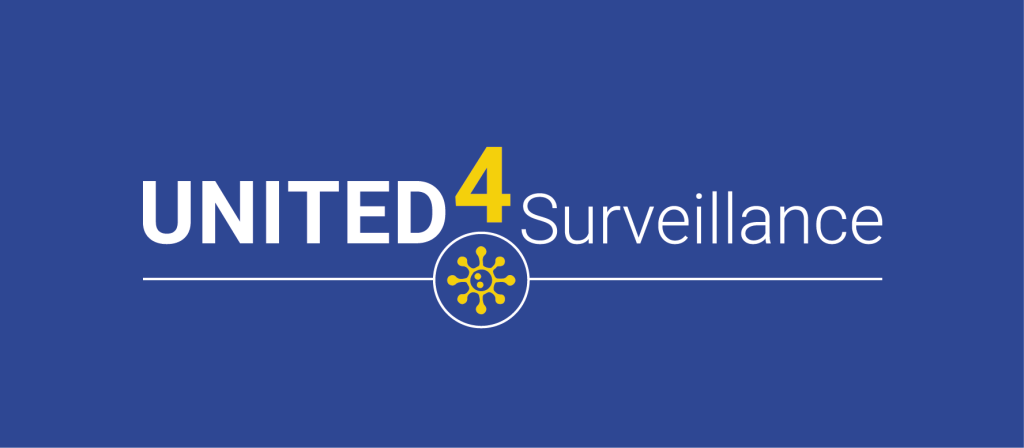About the project
Results
The UNITED4Surveillance tasks, deliverables and publications will show the work and progress of the project.

The UNITED4Surveillance consortium will publish project results on Zenodo. Zenodo is EU’s Open Research Repository. Check our results by becoming a member of our UNITED4Surveillance community!
UNITED4Surveillance Progress Report
Periodic Reporting for period 1 – UNITED4Surveillance
Periodic Reporting for period 2 – UNITED4Surveillance
Reporting period
01-01-2023 to 30-06-2024
01-07-2024 to 31-12-2025
Progress UNITED4Surveillance - Reporting period 1
This summary highlights the progress of UNITED4surveillance in achieving its objectives for each work package and outlines significant activities and accomplishments up to 30th June 2024.
Activities of WP2 Outbreak Detection have progressed according to plan with milestones and deliverable having been achieved. For Task 1 “Improving laboratory-based reporting”, a survey, focused on legal, policy/organizational, data/IT and financial aspects with respect to laboratory-based reporting, shed light on current needs and gaps among 23 countries of the UNITED4Surveillance consortium. Two workshops were held with the objective to kick-off task 1 activities and to discuss data standards for genotyping/subtyping. In addition, country-specific pilots focused on improving national laboratory-based reporting have started and are currently ongoing in the four piloting countries Denmark, Finland, the Netherlands and Norway. Under Task 2 “Outbreak and Signal Detection” an open-source R package for signal detection was jointly developed with data scientist from Austria, Denmark, Finland and Germany. The Signal Detection Tool generates signals based on national surveillance data and enables users to analyze these results using a dashboard with flexible exploration and generation of a report. The tool is actively used and piloted by eleven European NPHI from April to November 2024. Prior to this, a workshop was held in May 2023, bringing together 30 public health professionals from 16 countries, preceded by a survey on the use of automated outbreak detection tools. Through one-on-one meetings, consultation hours and site visits with the piloting countries, requirements for the tool and data format are continuously assessed and refined. Results and achievements of WP2 are further described in Milestone Reports and in Deliverable Report D2.1.
In WP3 Hospital surveillance, we have made significant progress in achieving our milestone and deliverable objectives. In April 2023, we completed a survey for active and passive participants in WP3, and in May 2023 we successfully held a kick-off workshop to discuss these results and preliminary piloting plans. In August 2023, we reported on the survey results and piloting plans in Deliverable 3.1. Four pilot studies (Latvia, the Netherlands, Malta, and Slovenia) started in Task 3.1 of WP3 with the aim of establishing or improving sentinel-based, electronic hospital surveillance of serious infectious diseases or syndromes. In Task 3.2 of WP3, four pilot studies (Finland, Italy, Norway, and Poland) were initiated to integrate clinical information on hospitalized patients with microbiological data. Legal issues/GDPR, linking multiple data sources, and blueprint/framework were identified as common themes on which piloting countries can collaborate further towards future recommendations and sharing of best practices. These pilot studies are currently ongoing and expected to be completed by the end of 2024.
In WP4 One Health, we have met our objectives until now. Stakeholder analysis and systems mapping workshops were finalized to identify gaps in the current One Health Surveillance systems of the participating countries. In January 2024, pilot studies were initiated in several countries for Salmonella (Belgium, Lithuania, and the Netherlands), Shiga toxin-producing Escherichia coli (STEC) (Denmark and Italy), swine influenza virus (Norway), both avian and swine influenza virus (Austria, Belgium and Denmark), West Nile virus (Spain), tickborne encephalitis virus (Lithuania), and Francisella tularensis (Austria). These pilot studies aim to improve the current One Health surveillance systems and will run until the end of 2024 or mid-2025 in some countries.
WP5 Evaluation has successfully completed the evaluation framework for the project. This includes the development of the evaluation plan to guide the overall evaluation process. An evaluation workshop was conducted, with findings detailed in the workshop report. Additionally, survey data is being continuously collected and will be incorporated into the final evaluation document, which will be published at the project’s conclusion. WP6 Dissemination activities have progressed as planned. Project dissemination materials (website, logo infographics, presentation and letter templates) were created and used for dissemination purposes. Templates for Joint Action dissemination plan and National dissemination plan were finalized, and dissemination and communication activities are regularly monitored. In WP7 Sustainability, the templates for the Joint Action Sustainability plan and National sustainability plan were completed, and countries provided input about using the outcomes of the UNITED4Surveillance after the project has ended.
UNITED4Surveillance Deliverables
DELIVERABLE
TASK
NAME OF THE DELIVERABLE
Work Package 1: To coordinate the Joint Action through well-functioning management which includes timely reporting, budget control and support for successful implementation.
D1.2
Booklet of 15-17 pages in layman’s language that summarises the project, WP’s, deliverables and results For outreach purposes
Work Package 2: To support outbreak detection and pandemic preparedness by improving real time surveillance for a timelier coordinated response.
D2.1
Review/inventarisation of existing laboratory surveillance systems; outbreak detection systems or methods of participating countries, including needs and gaps; and description of planned pilots
D2.2
Recommendations and trainings-package for improved laboratory-based reporting and outbreak detection methods
Work Package 3: To build a foundation for timely, comparable, and representative surveillance of severe infections leading to hospitalization
D3.2
Recommendations and trainings-package for digitalised surveillance systems of severe infectious diseases leading to hospitalization
Work Package 4: To develop One Health surveillance structures with integration of data/signals from the human, animal, and environmental domains to enhance
i) the capability of detecting (re)emerging pathogens with zoonotic potential and performing public health risk assessments;
ii) source identification of outbreaks;
iii) research into targeting interventions.
D4.1
Inventarisation of goals, stakeholders and One Health surveillance systems in Member States
D4.2
Recommendations and trainings-package for implementing One Health surveillance
Work Package 5: To perform a systematic and objective assessment of the relevance, efficiency, effectiveness, impact, economic and financial viability, as well as sustainability of the project in the context of its objectives
D5.2
Final Evaluation Report
Work Package 6: To achieve efficient and effective visibility, awareness, and acceptance of the project to internal and external stakeholders.
D6.4
Final dissemination report
Work Package 7: To integrate best practices of surveillance in national policies and improve cooperation mechanisms between EU Member States.
D7.1
Baseline report on the National sustainability plans
D7.2
Progress report on National sustainability plans implementation
D7.3
Final Report: Roadmap to implementation of integration infectious diseases surveillance
Disclaimer: Funded by the European Union. Views and opinions expressed are however those of the author(s) only and do not necessarily reflect those of the European Union or HaDEA. Neither the European Union nor the granting authority can be held responsible for them.
List of publications
Publication 1>
Publication 2>
Publication 3>
Publication 4>
